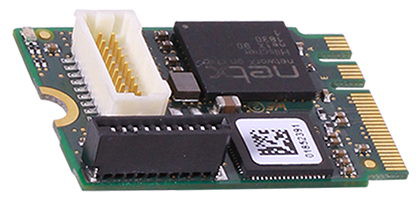The 22 x 30mm PCI Express M.2 card is smaller than the Mini PCI Express format and was designed for thin computing platforms such as notebooks and tablets. Since its introduction, manufacturers of PC-based automation systems have been building M.2 sockets into their products to allow functions to be added without needing much space.
At the heart of the Hilscher CIFX M223090AE card is its netX 90 multiprotocol communications chip. Users can load firmware for the Profinet IO, EtherNet/IP, EtherCat Slave and OpenModbus/TCP protocols. Later this year, CC-Link IE Field Basic and Ethernet PowerLink Slave will be added.
The cards come with all of the necessary hardware and software components, including protocol stacks, device drivers and network connectors. They can be installed in new or existing PC devices to connect them with industrial automation networks on the fly.
Hilscher argues that choosing its M.2 card will allow users to future-proof their designs. It plans to offer new firmware for real-time Ethernet, traditional fieldbuses and IIoT protocols. It is also providing device drivers for all major industrial operating systems, including Windows, Linux, INtime, RTX and QNX, as well as a C Toolkit for custom device drivers.

Hilscher's M.2 card adds real-time industrial communications to PC-based systems
If required, there are adapters available from third-party vendors for other key formats. Hilscher is planning extra firmware options, more card and key formats, as well as support for OPC UA and MQTT.
In addition to its small size, the netX 90 chip also offers low power consumption, with little waste heat, making it ideal for energy-saving applications. It can operate in temperatures from –20 to +70°C.

